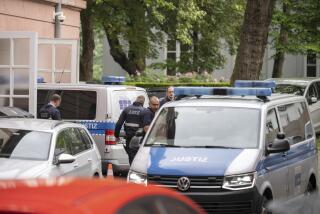Former E. German Leaders Charged in Border Killings
- Share via
BONN — Five years after the fall of the Berlin Wall, public prosecutors announced Monday that they had filed charges against former East German leader Egon Krenz and six other Communist Party Politburo members in connection with the killing of defectors trying to flee across the old East-West divide.
The accusations of multiple counts of manslaughter and attempted manslaughter represent the latest attempt by German authorities to put the top brass of the former East Germany on trial for Communist state repression.
Krenz, 57, succeeded Erich Honecker as the Communist Party and state chief following Honecker’s 18-year reign but lasted just six weeks before a peaceful revolution swept him out of office on Dec. 3, 1989.
Uta Foelster, spokeswoman for the Berlin prosecutor’s office, declined to identify the other six people charged until they have had time to read the 1,600-page complaint, but they reportedly include Guenter Schabowski, 69, who inadvertently announced the opening of the Berlin Wall on Nov. 9, 1989; trade union boss Harry Tisch, 67, and party ideologist Kurt Hager, 82.
The case is the result of a three-year investigation that is reportedly the longest and most costly probe into government crime in Germany. It covers the deaths of people who were gunned down by border guards with shoot-to-kill orders or felled by mines and weapons systems that fired automatically at anyone in the forbidden zone around the wall.
More than 580 East Germans died trying to escape their country, many of them at the cement and barbed-wire wall raised Aug. 13, 1961, to keep them in, officials said.
Foelster said the prosecution will try to prove that the Politburo members are guilty of inaction--failing to prevent the border deaths--as well as of active complicity in some of the deaths.
“The Politburo was the highest uncontrolled organ of power in the former German Democratic Republic, and it had the authority to make decisions about the border regime,” Foelster said.
Asked why the government is pressing the charges so long after the wall came down, Foelster said former West German prosecutors became entitled to investigate East German government crimes only after German reunification on Oct. 3, 1990, and that the case had been bogged down by the sheer volume of documents to be reviewed.
Besides, she added, “It is just more difficult to convict a so-called mastermind than the border guards who were directly involved.”
More than 20 border guards have been tried for murder, and several convicted, provoking criticism that small fish have been made to pay for the sins of the East German government while the leadership has gotten off.
In November, 1992, the former National Defense Council of the GDR--Honecker and five others--went on trial for manslaughter, accused of issuing the shoot-to-kill orders. But the elderly Honecker, Ministry of State Security (Stasi) chief Erich Mielke and Prime Minister Willi Stoph were excused for ill health. Honecker died of liver cancer last year in Chile.
The three who were convicted--including former Defense Minister Heinz Kessler--received prison terms of between 4 1/2 and 7 1/2 years but remain free pending appeals.
Krenz told the German Press Agency, DPA, that the German government has no right to try him for political decisions made in what was then a separate country.
Crimes committed by the former East German government are a subject of intense debate, with some opposition political leaders arguing that Germany should put the Cold War behind it, particularly regarding the use of state police or Stasi files. Here too some opposition political leaders have argued that small-time informers have lost their jobs while bigger collaborators have not been held responsible for their crimes.
In the case of Krenz, political commentator Thomas Kielinger argued that a trial would be “a futile exercise that we have gone through before. It is belated, and we will see it all unravel in the end because the evidence does not hold up.”
He said that the government should pursue individuals for specific crimes but that it lacks the moral authority to go after the Communist leadership with whom it had diplomatic relations and normal dealings.
But Wolfgang Thierse, vice chairman of the Social Democratic Party for eastern Germany, said the legal system cannot cave in to resignation.
“I think it makes sense to finally call the responsible persons, the members of the Politburo, to account legally, even if the attempt should fail in the end,” he said.
More to Read
Sign up for Essential California
The most important California stories and recommendations in your inbox every morning.
You may occasionally receive promotional content from the Los Angeles Times.













